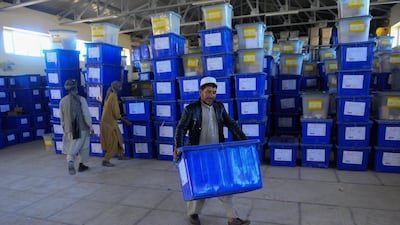After a delay of nearly three years, Afghans are preparing to vote in the parliamentary elections on October 20.
But even before the vote begins, the process has been blighted by insecurity, violence, political intrigue and mounting instability.
Despite security threats and concerns over the electoral process, there is an unmistakable excitement among Afghans across the country for the parliamentary polls.
Nearly 8 million Afghans have registered to vote for over 2,565 candidates contesting 249 seats in the parliament.
A large number of these candidates – about 60 per cent – are under 40 years of age. The promise of fresh blood and new ideas is perhaps what has generated tremendous interest from an otherwise war-weary nation.
Local activists say the newer faces, despite being less powerful, are challenging the position of entrenched warlords.
A sign they may be shaking up the established status quo is the number of attacks on candidates.
A few weeks ago a political rally by a young candidate Abdul Nasir Momand was targeted in Kama district of Nangarhar, killing 13 and injuring 42 of his supporters. Mr Momand escaped unhurt and remains determined to contest the elections.
At least 10 candidates have been killed in attacks or by gunmen in the last few months, making this campaign seasons one of the deadliest in history.
The Taliban remains opposed to the vote, despite their ongoing negotiations with the US administration. In a statement last week they warned candidates to refrain from participating in the elections. “Your nomination and success directly supports the vicious objectives of American invaders by legitimising their bogus procedures and conspiracies, which is indeed supporting them in killing the pious Muslims and destroying the country by extending the ongoing war,” the statement read.
In provinces like Kandahar, Helmand and Ghazni – where the Taliban contests entire districts – the security situation remains extremely vulnerable, casting doubt on whether the vote will be held. "Elections might not take place in several districts in Kandahar that are under the Taliban control. Same goes for Uruzgan and Zabul provinces," a local journalist from Kandahar told The National.
Across the country, security concerns have reportedly shuttered nearly 2000 polling stations.
Southern provinces including Kandahar, Helmand, Uruzgan and Zabul which were traditionally power centres for the old political ranks are also leaning towards newer faces.
_______________
Read more:
Afghan elections 2018: what you need to know
Youth wave challenges Afghan elections
Taliban kills 26 Afghan forces as election bloodshed continues
_______________
Peace negotiations and security are the top issues for candidates. Nearly 3,000 Afghan civilians have been killed so far this year, with over 5,000 injured in violent attacks.
While parliamentarians in Afghanistan don’t make decisions relating to security forces, they do have the authority to allocate international funds and to deliberate over security matters.
The focus on security issues during the campaign is especially urgent for provinces and regions that were previously considered safer, such the northern belt. A resurgent Taliban and the emergence of ISIS in the north could potentially affect the outcome of the elections in provinces like Faryab, Samangan and Baghlan, where many polling stations will likely remain closed and a large proportion of the population has not registered to vote.
Political parties have less influence in the Afghan parliament than in many other countries but the relatives of several prominent warlords are running for seats. In Baghlan, the son of notorious Uzbek strongman and the vice president Abdul Rashid Dostum is running for office. “General Dostum’s daughter had also planned to run but then decided not to,” said local journalist Ajmal Omari.
In Balkh, the son of Mohammad Mohaqiq, the second Chief Executive of Afghanistan (a recently created post equivalent to prime minister), is representing the Hezbe Wahadat party founded by his father.
In Kabul, which has 33 seats being contested by 804 candidates, security is extremely tight ahead of the polls. Makeshift checkpoints have sprung up across a capital bedecked in election posters.
Several of Kabul’s prominent candidates, many of them young, are independents. But an established old guard refuses to retire.
Despite the presence of 22,000 biometric devices to confirm the identities of voters across Kabul, many voters remain concerned at the prospect of fraud. And if history is any indication, contested results could add to the political instability, and could eventually impact presidential elections scheduled for April next year.

